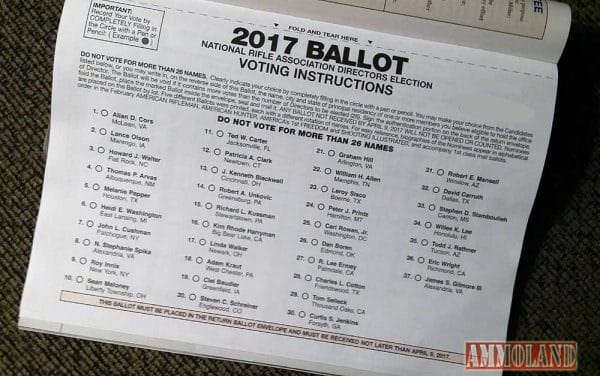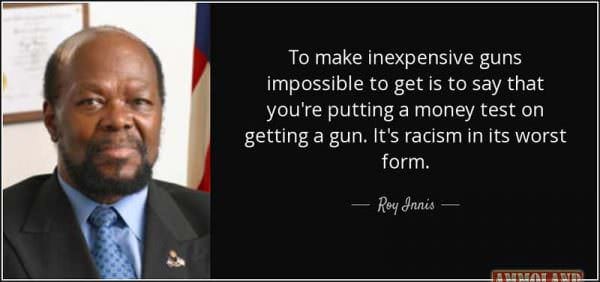This is a personal opinion and is not position or policy of the National Rifle Association of America (NRA).

U.S.A. –-(Ammoland.com)- With the announcement of NRA’s 36 candidates for the 2018 Board of Directors election, we’ll look back at a small piece of 2017’s election and NRA leadership legacy. Why present this unique situation? I am the only non-nominated member of the NRA Board of Directors, and we know the legacy of my specific seat.
Known as a legislative force since the 70’s, the NRA for 140+ years is the gold-standard in so much more – firearms training, competitions, safety, certification, collecting, shooting, hunting, and conservation, and more. This article adds transparency to the NRA election process, and tells of how I dropped into the middle of NRA leadership legacy.
Each year, NRA elects 25 board members for three-year terms. In exceptional years, there are additional seats to fill if a position opens by resignation or death. NRA Life members and current members for five or more consecutive years receive their ballot in their Official NRA periodical (first-class letter for Hawaii only). With the published figure of 5.2 NRA million members, there are almost 2.2 million who receive ballots. Few other major organizations allow “you” to have a say. Disappointingly, and consistently, only about 7% of NRA ballots are returned (135,000 for 6.2% in 2017).
An additional Board member, #76, is elected for a one-year term by membership attending the NRAAM. There’s a reason for this basic background, keep reading.
Unlike a legislative race in your hometown or state where candidates know their district boundaries and registered voters, NRA does not tell who or where the NRA voters are. NRA Board candidates run a national election to find two million NRA voters mixed in with 320 million Americans. Without celebrity name recognition, it is a shotgun approach (no pun intended) to find an eligible voter, earn their vote, and convince them to vote. This is important to understand the unlikely odds of the below scenario.
Each Board member has strengths and weaknesses, areas of expertise, particular preferences and dislikes. Celebrities with name recognition typically don’t have to campaign. For grassroots folks who do the nug work on committees, the NRA election is relatively daunting.
The NRA Nominating Committee receives recommendations and presents a ‘slate’ of NRA-approved nominees. Usually, all incumbents plus a few others with solid resumes and Board member support. Having been involved with Board activities and serving on NRA committees, I was fortunate to receive a nomination in 2016. Still, I lost, mostly. NRA maintains the election order of votes received to fill vacancies between elections. I lost “mostly” by finishing #28 of 37. My “loss” got interesting when previous incumbents #26 and 27 moved back on the Board. I became “one off” in the fall of 2016. One Off is the guy, or gal, to next move up.
In January 2017, Mr. Roy Innis died. Mr. Innis was an icon in the civil rights movement. Since 1968, he was the Chairman of the Congress of Racial Equality (CORE) which included his fight for gun rights, especially minority rights of self-defense. Roy was a 25-year member of the NRA Board of Directors. I met Roy in passing years ago, and the past two years served on his NRA Urban Affairs Committee. Roy’s son Niger and I are close friends from years in the conservative movement and we work together on the renamed NRA Outreach committee.

Interestingly, NRA always has 76 board members. Within hours of Roy’s death, I had been contacted, provided and filed the proper paperwork, and scheduled for swearing in. I had Roy Innis’ Board seat, no one fills his shoes, from January to April.
I was not nominated by the NRA Nominating Committee for 2017. When Committee results were announced, long-time NRA Board member Col. Ollie North “suggested” I seek ballot access by petition. Having only one, versus six, months to collect signatures, we succeeded because many of you signed and collected signatures. Now an outsider, our team worked hard to make the case for Board membership. A grassroots campaign, your votes secured a seat. Thank you. That isn’t the end of the story.
In 2017, there were 27 spots open. 25 as is the norm, a two-year position due to a death, and a one-year due to resignation. The top vote-getters, with name recognition, receive about 80-100,000 votes. As the numbers decrease, there were six or seven candidates separated by scant hundreds of votes clustered around 69,000 now competing for three seats. This time, you propelled us to win #26, the two-year vacancy. Disappointed to not win a three-year term, it is a privilege to win any seat, to serve, and to contribute.
This seat carries another leadership legacy. Wisconsin’s Francis E “Buster” Bachhuber, Jr. was a lawyer with Infantry service in Korea. Buster was a renaissance guy. Had a law firm, and reloaded his hunting ammo. Was an Instrument-rated commercial pilot, and comfortable in the NRA-ILA trenches. He was a Director for 13 years. For the last three years, we’d speak during meetings as he shared his lessons learned. Buster died while serving. #26, the two-year seat.
What are the odds out of 320 million in America, 5.2 million NRA members, 2.2 million voters, 135,000 votes cast, that for a second time I would know the legacy of my seat? Would I prefer to be one of the 25? Of course. As long as that isn’t the case, it is satisfying to know the legacy of today’s seat.
Many great patriots serve to make the National Rifle Association the most powerful Second Amendment advocate, firearms training and safety organization, and leader in conservation. In this case, we carry the leadership legacy of two who served selflessly with distinction. With legislative gun rights issues and the growing popularity of shooting activities, it is more important than ever to shape our Board with active leadership for the coming decade.
Research the candidates, and cast your vote.
About Willes K. Lee
 Lieutenant Colonel Willes K. Lee USA (Ret) is a member of the NRA Board of Directors from Hawaii and Virginia. He is a Benefactor Life member, serving on five NRA committees. Lee is a West Point graduate, U.S Army combat veteran, who served 26 years as a Defender of Freedom. Willes is the President of the National Federation of Republican Assemblies, a co-Chairman of the Trump-Pence Second Amendment Coalition, a member of the Council for National Policy, and on the board of the American Conservative Union Foundation, hosts of CPAC. He is a former GOP State Chairman and RNC member. Follow Lee www.WillesLee.com, Twitter and Instagram @WillesLee, and www.Facebook.com/WillesLeeNRA.
Lieutenant Colonel Willes K. Lee USA (Ret) is a member of the NRA Board of Directors from Hawaii and Virginia. He is a Benefactor Life member, serving on five NRA committees. Lee is a West Point graduate, U.S Army combat veteran, who served 26 years as a Defender of Freedom. Willes is the President of the National Federation of Republican Assemblies, a co-Chairman of the Trump-Pence Second Amendment Coalition, a member of the Council for National Policy, and on the board of the American Conservative Union Foundation, hosts of CPAC. He is a former GOP State Chairman and RNC member. Follow Lee www.WillesLee.com, Twitter and Instagram @WillesLee, and www.Facebook.com/WillesLeeNRA.
